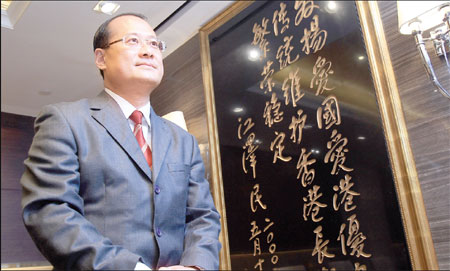Competition Law irks business community
Updated: 2011-09-16 07:56
(HK Edition)
|
|||||||
|
While understanding the government, Jonathan Choi Koon-shum hopes policy makers will heed the views of the many businessmen who dread the implementation of the proposed competition law. Edmond Tang / China Daily |
The Chinese General Chamber of Commerce - one of Hong Kong's four leading business guilds - is worried that the Competition Law Bill, which has been under scrutiny by lawmakers for more than a year, would seriously affect the operations of small and medium-sized enterprises (SMEs), if implemented, says chamber Chairman Jonathan Choi Koon-shum.
"While we support the government and has not asked it to scrap the bill, we hope the government will listen to the views of the business sector," he says.
"We hope that SMEs, which form about 98 percent of our economy, would be exempted from the proposed law otherwise they could be seriously affected. We also want the Hong Kong Trade Development Council to be excluded from the list of statutory bodies under regulation as it would be deemed anti-competitive if it continues to help SMEs find business and development opportunities."
It has been the business community's understanding that the government would enact an anti-monopoly law to specifically target big players in the petrol and telecommunications sectors, Choi recalls.
But, if the Competition Law comes into effect, it would not only implicate the large conglomerates, but also SMEs, he says. "SMEs worry that their voices would not be heard on the proposed Competition Commission. We are also concerned that commission's powers would be excessive if it is allowed to investigate and adjudicate. In our view, the power of adjudication should only be vested with the law courts."
SMEs are also concerned they would not be able to meet the legal costs if they are embroiled in lawsuits. "SMEs will be outplayed by large consortia financially if they are involved in competition disputes, even though they have done nothing wrong. They are also afraid of malicious, frivolous complaints by business rivals," Choi points out.
Following protracted discussions, Choi reveals that the government, however, has made concessions in some areas. For example, any enterprise found to have breached the Competition Law would be penalized if it holds a dominant market share in any particular sector.
At the chamber's suggestion, the term "market share" would be substituted by "business turnover" for better protection of enterprises.
"For example, if there are only two restaurants on a particular street or district, each of them would be deemed as taking up 50 percent of the market share and they would thus be accused of engaging in anti-competitive acts. We therefore ask the government to adopt the business turnover concept because a restaurant's business turnover may be low or insignificant even though there is little competition," Choi explains.
(HK Edition 09/16/2011 page4)
